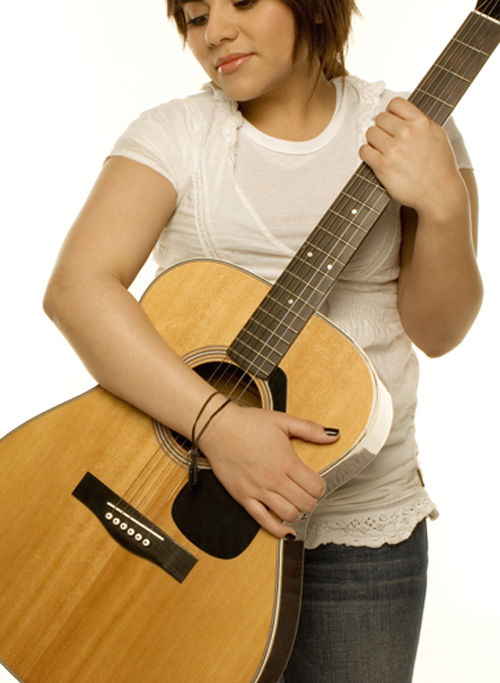

Stop 1 - What Every New Guitar Player Should Know
You've signed up for this tour because you think you want to play the guitar. That's awesome!
The guitar is a beautiful, fun instrument. But it is also fairly difficult as musical instruments go. And so many new guitar players like you get discouraged because progress can be slow.
That's not going to be you... right?! Because you're going to avoid some of the common mistakes new guitar players often make.
Here are Some Things to Avoid
First, Don't use an old guitar that's been sitting in the attic for 10 or 20 years.
Chances are it will be "clunky" amd hard to play - too big and cumbersome, with corroded hard-to-press-down strings, and lousy "action".
"Action" is the term for how easy it is to press the strings down. If they are too high up off the fretboard, the guitar will be a lot more difficult to play than it should be.
Second, Don't run out and buy an expensive guitar
Guitars can get very expensive, and that will usually have an impact on both their playability and the quality of the sound they produce.
But as a beginner you won't be able to take advantage of those expensive benefits. All you really want to do is get to know your way around the instrument, and learn some basic techniques. An inexpensive "starter" guitar is perfectly adequate.
Third, Don't play with stiff metal strings
Most guitar players just automatically think they should be playing with metal strings. But for a beginner metal strings are hard on the fingers and playing can be painful.
Start with nylon strings - like you find in all classical guitars. You can change later when you get past the beginner stage. In fact you'll probably want a better guitar at that stage anyway, and you'll be in a much better position to know what to get.
Fourth, Don't spend all your time learning Chords
There are at least two distinct paths you can take to learning the guitar.
First, like many new guitar players you can focus exclusively on learning Chords right from day 1. This may get you playing along with basic songs fairly quickly.
But the problem with this approach is that you will tend to learn five or six chords and get stuck at that stage. And chances are you won't bother learning any music theory. This makes the guitar basically a chording instrument.
But it can be so much more.
The other approach is to learn how to play individual notes - melodies of songs, for example. What this does is force you to learn where the notes are located, and how the strings are related to each other.
And unless you're going to play everything "by ear" or from memory, you also will have to learn how to read music.
Fifth, Learn how to Read Music
This is where it gets a bit controversial, because so many guitar players have never learned any formal music theory, have never bothered learning to read traditional notation, and see no practical application of these things to their guitar playing.
But the advantages of learning a bit of music theory are pretty obvious once you get over the original hump. And getting over that hump is actually quite easy. We're not talking here about learning complicated stuff. At the beginning you just want to learn a few basics so you can use them for learning purposes: scales, exercises and simple melodies.
Sixth, Don't bite off more than you can chew
Yes, every new guitar player wants to get right into Stairway to Heaven or Hotel California. But once you realize that it actually takes skill to play these songs, you should be happy to play simple melodies like Ode to Joy, Hallelujah, Imagine, Budapest, Havana, or Amazing Grace.
These easier songs are actually doable within a reasonable amount of time, and with a bit of regular practice.
Follow these six suggestions and chances are you'll be playing the guitar within a few weeks!
And, oh yes, there's one more thing:P-R-A-C-T-I-C-E.
How good you get at the guitar and how quickly you get there are directly related to the amount of practicing you do.
Good Luck and "May the Guitar Gods be With You."